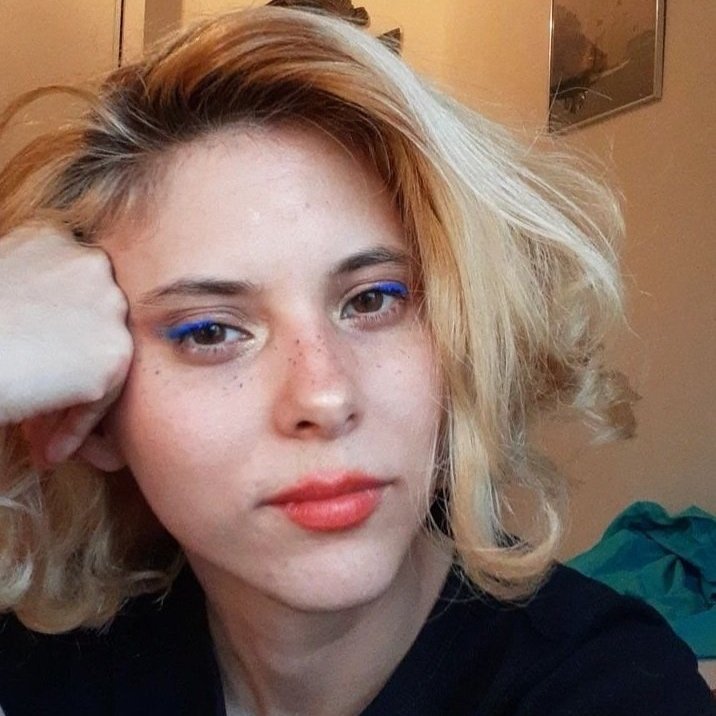Bisexuality+ and Christianity
Queer Chretien-ne (she/her) is a youtuber and bi+ activist who writes about biphobia and bisexual experiences and promotes bisexual and pansexual grass root organizations in France outside of Paris and protest LGBTQIA+ inclusion within Christianity.
Queer Chretien-ne (she/her) is a youtuber and bi+ activist. She has written about biphobia and bisexual experiences on her instagram account and promotes bisexual and pansexual grass root organisations in France outside of Paris. She is more generally involved in LGBTQIA+ inclusion in the christian religion.
What is the nature of your work?
I am interested in bisexuality because after years of activism for LGBTQ+ inclusion in christianity, I noticed how I was fighting for all the letters but mine.
3 things you wish everyone knew about bisexuality?
Biphobia exists.
Bi+ women in heterosexual relationships are exposed to biphobia in a very specific way.
Access to bi+ community can reduce the negative effect of biphobic prejudice.
Tell us more about the nature of your work.
My main work is focused on queer christian theology. I began my youtube channel with LGBTQIA+ bible characters, presenting queer people like David and Jonathan, who were lovers. I mentioned when they were clue about bisexuality when it occurs, but was not particularly prioritising bi+ caractere at the beginning of my work. As my audience got bigger I felt more free to address my personal struggles surrounding bisexuality. I worked on vulgarisation of the body of research on biphobia and intimate violences. My youtube channel is more dedicated to academic work, instagram allowed me to express personal views about bisexuality. My writings are about the need for bisexual women in heterosexual relationships to access a bisexual community. My more viral instagram post was a small essay about bisexual grief. It described the late acceptance of one self orientation, while being married or in a long term and loving heterosexual relationship. This grief is often overlooked and not well understood by non-bi people, and the post got a surprising peak of attention.
What is the most interesting thing you have learned about bisexuality+ from your research?
It took me time to accept the reality of biphobia and its consequences. The first and most eye opening stat I read when I was working on my content was a 2017 paper from Coston et al. They concluded that for the same sexual pattern -having male and female intimate partners- women who identified as bisexual face up to 7 times more intimate violence than women who identify as heterosexual or lesbian. I have heard for so long that biphobia is not a real thing, and that bisexual women can only be subjected to lesbophobia. This article blew my mind and tackled the last self doubt about my legitimacy to talk about biphobia.
The second most interesting fact I read is the stat about long covid in bisexual community in the USA. Bisexuals, alongside the trans community, have the highest rate of long COVID. It showed me why it is important to look at our community as a distinct group with its own struggle. Even for complicated and specific subjects that look like unrelated like... long COVID.
Are you bi?
Yes, I am bisexual!
Does being bisexual+ change how you approach your research or work? How so?
Being bi definitely changed my activism. I was an LGBTQIA+ "generalist" activist for years. Because as a religious person, I greatly suffered from being exposed to homophobic and transphobic discourses. I was not directly attacked because I was bi -I wasn't out- but I knew that if my religious friends hated gays, lesbians and transgender people, they would hate me if they knew I was bi. So I always have considered that no one is safe until all the letters are normalised, accepted, and loved. This is what I learned as a former invisible bisexual.
Tell us a little about your experience? When did you know you were bi+?
I knew I was bi as a teenager and hated it. I grew up in a very strict religious environment and tried several things to get straight. I understood and accepted I was bi as a young adult as I was married with a man, mother, and living the "perfect christian life". Only then, when I had tried everything, I understood that it was not some demonic temptation. Bisexuality was just something I own.
Do your friends, family, or colleagues know you are bi+?
Today all my family and friends know I am bi. My colleagues know about it as well. I am very vocal about it and witnessed many times how being out would open conversations and others coming out. My favourite experience about it was a college science class. One guy came out as gay. I came out as bi. By the end of the year, we were 5 bi, pan and questioning girls and boys out, alongside with 2 gay guys.
When did you come out as bi+? Was there any particular reason you came out as bi+?
I first came out as bi in my french religious congregation during gay marriage debate in the USA. I prayed and felt it was time for me to come out. It was both awful and liberating. I took the microphone during the Sunday gathering and told everyone I was bi, and that LGBT were statistically everywhere, in society and in churches. I told them that each time they were talking trash about gay people, we were there. And that it was really painful. My ward was very conservative, but one lady was a liberal. She hugged me and cried and told me she was so proud. I never went back in the closet. My activism began that Sunday.
Learn more about Queer Chretien-ne here.

